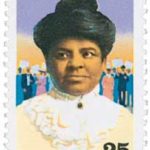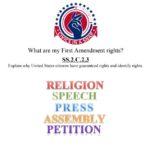Why are the founding principles essential for a free society? This civics and government lesson plan was developed to facilitate instruction and discussion concerning the United States’ founding principles versus totalitarian systems of government. Students will contrast a totalitarian system of government with the founding principles of the United States as established in the Declaration of Independence, the US Constitution, and the Bill of Rights.
Civics and Citizenship
Civics and Citizenship explores both the rights guaranteed to Americans as well as the attendant responsibilities that come with those rights. Ultimately, the unit culminates with students writing, producing, and sharing a Public Service Announcement that defines, shows, and advocates for civic engagement. The goal of the lesson is that students actively assume the responsibilities of an engaged and thoughtful citizen.
Ida B. Wells and Her Crusade for Racial Justice
The Fugitive Slave Law of 1850
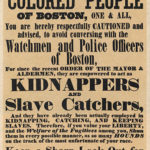
In 1850, Southerners succeeded in getting a new federal law passed to return fugitive slaves who had escaped to the North. The U.S. government enforced this law, but some Northern states passed laws to resist it. Sometimes, free blacks and sympathetic whites joined to rescue captured fugitive slaves.
Learning about the Preamble to the U.S. Constitution
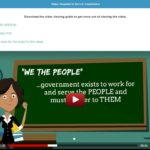
This resource provides students with an English language video and associated student friendly readings (in English, Spanish, and Haitian Creole), as well as reading and video guides and self assessment tools. Using these, students will explore the meaning and importance of the Preamble.
Free registration is required to use the resource.
How Do We the People Influence and Monitor the Government?
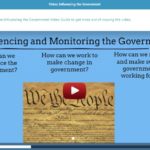
This resource provides students with an English language video and associated student friendly readings (in English, Spanish, and Haitian Creole), as well as reading and video guides and self assessment tools. Using these, students will consider the different ways that citizens, interest groups, and the media can influence and monitor government.
Free registration is required to use the resource.
Arguing Arkansas: Analyzing the Impact of Eisenhower’s Little Rock Speech
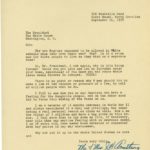
This lesson, developed in collaboration with the National Archives, has students explore a number of primary sources, all connected to the events at Little Rock High School. It asks students to consider how the events at Little Rock may or may not have been impacted by the words and leadership of President Dwight D. Eisenhower.
The Road to Independence
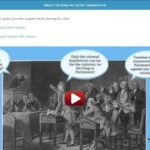
This resource provides students with an English language video and associated student friendly readings (in English, Spanish, and Haitian Creole), as well as reading and video guides and self assessment tools. Using these, students will explore the road to independence and key events along the path to the Declaration of Independence!
Free registration is required to use the resource.
What are my First Amendment Rights? A Lesson for Early Elementary
Learning About Articles I, II, and III!
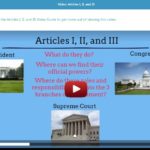
This resource provides students with an English language video and associated student friendly readings (in English, Spanish, and Haitian Creole), as well as reading and video guides and self assessment tools. Using these, students will explore the basic foundation of the Constitution contained in Articles I, II, and III.
Free registration is required to use the resource.
